Gabon: camping on the haute Banio
After spending time with Victor, it was then time to continue my surveys for wild manatees. As I mentioned in my previous post, I haven’t been to this lagoon since 2006. At that time I only spent 2 days doing surveys because during my first season I traveled to many different parts of Gabon to get an overview of the country. So this time we did a much more in-depth survey of the entire south end of the lagoon, camping in a different place each night. I was accompanied by Papah, a biological technician at Mayumba National Park, and Chardene, who does educational outreach for the park. Papah worked with me when I was here in 2006 and I was impressed with how much he’s learned about the lagoon since then. Both of them know everyone in the villages and speak Villi, the local language. Almost everyone also speaks French, but it puts peple at ease when they can speak the local language, and part of the trip was for Chardene to learn how to do the interviews (which she mastered by the second day).
Happy campers: Papah and Chardene as we quietly paddle a cove.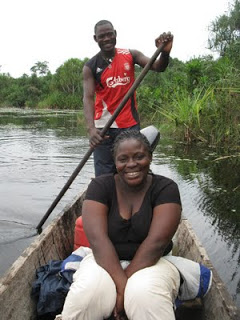 In the daytime we visited villages, interviewed people about manatees, and collected plant specimens as references for my stable isotope work (in order to know what manatees eat, I need reference samples of the plants they eat which isn’t easy since no one knows all the species and there are literally thousands of different plants here). In the evenings after dinner we headed back out on the lagoon to look for manatees (we looked during the day too, but didn’t see any and the population seems low here).
In the daytime we visited villages, interviewed people about manatees, and collected plant specimens as references for my stable isotope work (in order to know what manatees eat, I need reference samples of the plants they eat which isn’t easy since no one knows all the species and there are literally thousands of different plants here). In the evenings after dinner we headed back out on the lagoon to look for manatees (we looked during the day too, but didn’t see any and the population seems low here).
One evening we had a manatee right next to our boat and as it dove under us Papah could see it’s entire body. We were all very excited, manatee sightings are rare here! We were enthusiastically talking about it when we all started to hear a loud humming sound as darkness fell. I thought it was a large boat engine in the distance. Then we all realized (to our horror) that it was the roar of millions and millions of mosquitoes coming from the center of the lagoon! As we boated back to camp the mosquitoes were literally as thick as a snow storm and you couldn’t speak without getting a mouthful! It was unbelievable, but they were all in the center of the lagoon. Thankfully when we got back to camp, there were very few around.
Here are a few more photos from our lagoon tour:
Heading out into the peaceful lagoon early in the morning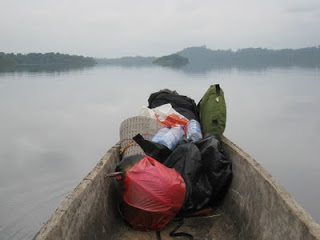 Our second campsite had elephant tracks everywhere, but they didn’t come while we were there. The lagoon is behind the trees.
Our second campsite had elephant tracks everywhere, but they didn’t come while we were there. The lagoon is behind the trees.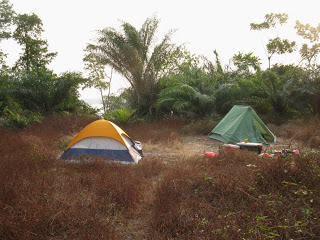 Chardene preparing fried plantains for dinner…yum!!
Chardene preparing fried plantains for dinner…yum!!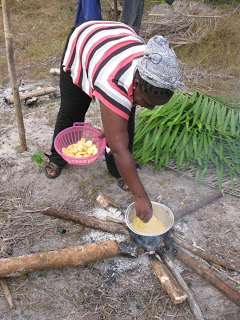 A common site here: a field of submerged lilies in the shallow waters at the lagoon edge. Manatees swim through a 3D dinner.
A common site here: a field of submerged lilies in the shallow waters at the lagoon edge. Manatees swim through a 3D dinner.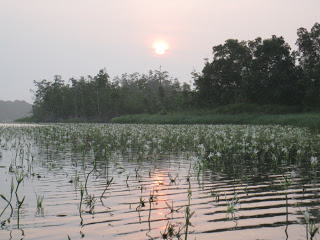 A manatee-eye view of the Crinum natans (white flowers) and water lilies
A manatee-eye view of the Crinum natans (white flowers) and water lilies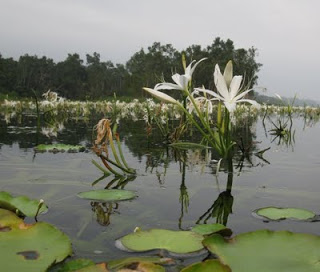 This aquatic plant occurs in several lagoons in Gabon but I don’t know what it is yet. There are very few references for aquatic plants in Africa so figuring out the plants is as much of a struggle as figuring out if manatees eat them!
This aquatic plant occurs in several lagoons in Gabon but I don’t know what it is yet. There are very few references for aquatic plants in Africa so figuring out the plants is as much of a struggle as figuring out if manatees eat them!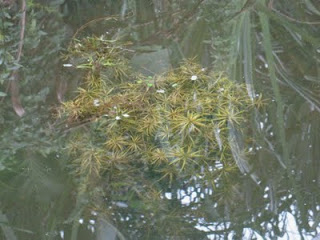 My plant bucket overflowed…
My plant bucket overflowed…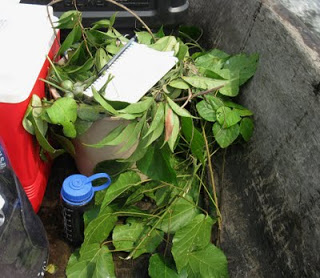 There is also beautiful forest and powder soft white sand at the lagoon edge. Evening swims were wonderful!
There is also beautiful forest and powder soft white sand at the lagoon edge. Evening swims were wonderful!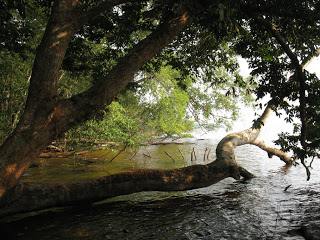 Chardene explains the manatee poster to a fisherman in the village of Malimbe. Most people here have never seen a manatee so they were interested by the photos.
Chardene explains the manatee poster to a fisherman in the village of Malimbe. Most people here have never seen a manatee so they were interested by the photos.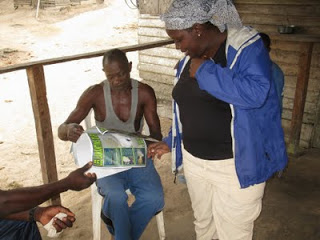 Fisherman in the village of Yoyo (no joke, that’s the name!) during our meeting.
Fisherman in the village of Yoyo (no joke, that’s the name!) during our meeting.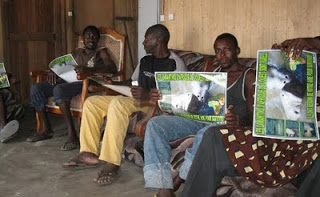 I got a big surprise at the village of Nkoko… there were Senegalese fishermen living there and they were so excited that I could speak alittle Wolof (thanks to my husband) that they invited me to a baptism and insisted I stay for the feast! You never know where the day will take you!
I got a big surprise at the village of Nkoko… there were Senegalese fishermen living there and they were so excited that I could speak alittle Wolof (thanks to my husband) that they invited me to a baptism and insisted I stay for the feast! You never know where the day will take you!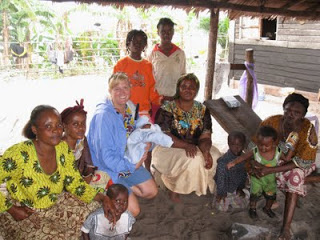 After the camping trip I returned to Rich’s house to work with Victor for a few more days. When I arrived Brice excitedly told me that the day I left, an adult manatee had appeared in the floating grass just outside Victor’s enclosure! It makes me wonder if wild manatees know he’s there. I could hear Victor “talking” when I snorkeled in his enclosure (manatees make high pitched chirping sounds, to hear some Florida manatees click here), so maybe other manatees are talking back to him!
After the camping trip I returned to Rich’s house to work with Victor for a few more days. When I arrived Brice excitedly told me that the day I left, an adult manatee had appeared in the floating grass just outside Victor’s enclosure! It makes me wonder if wild manatees know he’s there. I could hear Victor “talking” when I snorkeled in his enclosure (manatees make high pitched chirping sounds, to hear some Florida manatees click here), so maybe other manatees are talking back to him!
When I went back to Mayumba, I donated a manatee skull to the national park for use in their outreach programs (the manatee died of natural causes in N’dogo Lagoon in 2009 so I cleaned the skull for educational purposes) 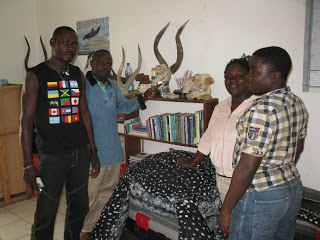 …and I dried all my plant samples (thanks to Rich, Brice & Junior for helping me devise this home-made plant drying rack!) before packaging them to ship to Florida or analysis.
…and I dried all my plant samples (thanks to Rich, Brice & Junior for helping me devise this home-made plant drying rack!) before packaging them to ship to Florida or analysis.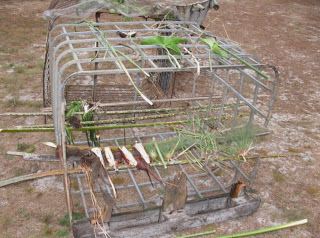
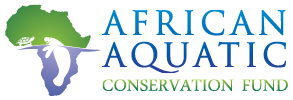
Lucy, I am flying to Mayumba to assist a forestry company with a project. Where is your work? It would be nice to visit the project. I will be there July 18, I think. Steve
Hi Steve, Unfortunately I'm no longer in Mayumba. I was doing manatee surveys there but I do not have a permanent project site there. The orphan manatee calf is kept at a private residence and unfortunately I can't extend an invitation for you to go there. I'm sorry! But Mayumba is beautiful and if you can rent a boat, yo should get out on the lagoon! God luck!
Thanks anyway, Lucy. I admire your work. Keep it up! If you ever are in the Libreville area, my wife and I run a small guest house. We'd enjoy hosting you and any of your colleagues. Take care, Steve
(LBVguesthouse@gmail.com)